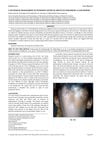 28 citations,
October 1978 in “Archives of dermatology”
28 citations,
October 1978 in “Archives of dermatology” Corticosteroids may effectively regrow hair in Alopecia Totalis with manageable side effects.
 25 citations,
February 2014 in “British journal of dermatology/British journal of dermatology, Supplement”
25 citations,
February 2014 in “British journal of dermatology/British journal of dermatology, Supplement” Intralesional triamcinolone acetonide can regrow hair in alopecia areata but often has temporary effects and side effects.
 January 2016 in “Springer eBooks”
January 2016 in “Springer eBooks” Cryotherapy may be an effective and simple treatment for mild hair loss with few side effects.
 146 citations,
July 2003 in “Journal of the American Academy of Dermatology”
146 citations,
July 2003 in “Journal of the American Academy of Dermatology” Clobetasol propionate ointment can help some people with total hair loss regrow hair.
 20 citations,
July 2006 in “Veterinary dermatology”
20 citations,
July 2006 in “Veterinary dermatology” Melatonin helped some Pomeranian dogs regrow hair, but it wasn't linked to estrogen receptors.
 16 citations,
May 2017 in “American Journal of Clinical Dermatology”
16 citations,
May 2017 in “American Journal of Clinical Dermatology” The document concludes that more research is needed to understand and treat Beard Alopecia Areata due to limited current knowledge and evidence.
 7 citations,
April 2021 in “British Journal of Dermatology”
7 citations,
April 2021 in “British Journal of Dermatology” Topical tofacitinib may effectively and safely regrow facial hair in some people with alopecia areata.
 12 citations,
January 2011 in “Photodermatology, photoimmunology & photomedicine”
12 citations,
January 2011 in “Photodermatology, photoimmunology & photomedicine” This therapy effectively treats resistant alopecia areata with minimal side effects.
 95 citations,
November 2018 in “Australasian journal of dermatology”
95 citations,
November 2018 in “Australasian journal of dermatology” Alopecia areata treatment varies, with no optimal method established yet.
 30 citations,
May 2016 in “Expert Opinion on Biological Therapy”
30 citations,
May 2016 in “Expert Opinion on Biological Therapy” New treatments targeting immune pathways show promise for severe hair loss but need more research for safety and effectiveness.
 22 citations,
April 2003 in “Eye”
22 citations,
April 2003 in “Eye” Applying latanoprost on skin can stimulate hair growth with minimal side effects.
 14 citations,
January 1985 in “International Journal of Dermatology”
14 citations,
January 1985 in “International Journal of Dermatology” The cause of alopecia areata was unknown, and while various treatments existed, no best treatment was agreed upon.
 June 2023 in “British journal of dermatology/British journal of dermatology, Supplement”
June 2023 in “British journal of dermatology/British journal of dermatology, Supplement” Some multiple sclerosis treatments may trigger hair loss conditions like alopecia areata.
 July 2022 in “Singapore Medical Journal”
July 2022 in “Singapore Medical Journal” Most children with alopecia areata improved with treatment, but those with more hair loss had worse outcomes.
 January 2020 in “Jornal Vascular Brasileiro”
January 2020 in “Jornal Vascular Brasileiro” Anticoagulant therapy may cause hair loss, especially in women, and stopping the medication can lead to hair regrowth.
 March 2016 in “Journal of evolution of medical and dental sciences”
March 2016 in “Journal of evolution of medical and dental sciences” Combining OMP with cyclosporine can effectively treat severe alopecia areata in children.
 218 citations,
April 2012 in “British Journal of Dermatology”
218 citations,
April 2012 in “British Journal of Dermatology” Guidelines suggest various treatments for alopecia areata, but leaving it untreated is also an option as 80% cases may recover on their own.
 85 citations,
October 2012 in “Dermatologic Clinics”
85 citations,
October 2012 in “Dermatologic Clinics” Alopecia Areata is an autoimmune condition often starting before age 20, with varied treatment success and a need for personalized treatment plans.
 36 citations,
May 2011 in “Dermatologic therapy”
36 citations,
May 2011 in “Dermatologic therapy” No treatments fully cure or prevent alopecia areata; some help but have side effects or need more research.
 12 citations,
June 2020 in “Dermatology and therapy”
12 citations,
June 2020 in “Dermatology and therapy” Platelet-Rich Plasma (PRP) can promote new hair growth and increase hair density, but its effectiveness varies depending on the type of hair loss.
 8 citations,
January 1989 in “Annual Reports in Medicinal Chemistry”
8 citations,
January 1989 in “Annual Reports in Medicinal Chemistry” Hair loss from alopecia areata and androgenetic alopecia can be treated, but more effective and safer treatments are needed.
 6 citations,
May 1993 in “Archives of Disease in Childhood”
6 citations,
May 1993 in “Archives of Disease in Childhood” Children's hair loss can be caused by many factors, including autoimmune diseases, emotional stress, genetics, and infections, with treatment and prognosis varying.
 4 citations,
November 2011 in “Archives of Dermatology”
4 citations,
November 2011 in “Archives of Dermatology” Hamilton scale imprecise, hair shaft diameter decreases, stem cell transplant regrows hair, ECP ineffective for alopecia areata universalis.
 March 2022 in “Nepal Journal of Dermatology Venereology & Leprology”
March 2022 in “Nepal Journal of Dermatology Venereology & Leprology” Methotrexate with steroids is slightly more effective than azathioprine with steroids for treating severe alopecia areata.
 July 2018 in “Elsevier eBooks”
July 2018 in “Elsevier eBooks” Some drugs can cause reversible hair loss, but certain chemotherapy drugs may lead to permanent hair loss; drugs can also change hair color and texture.
 January 2015 in “Springer eBooks”
January 2015 in “Springer eBooks” Some alternative treatments may help with hair loss, but more evidence is needed to confirm their effectiveness.

No treatment alters the natural progression of alopecia areata, and effectiveness varies, with some possibly working better in children.
 November 2012 in “South African Family Practice”
November 2012 in “South African Family Practice” The article concludes that early treatment of alopecia is crucial to prevent permanent hair loss.
 February 2009 in “Springer eBooks”
February 2009 in “Springer eBooks” Pregnancy can cause more body and scalp hair growth and make nails brittle, but these changes often revert after giving birth.
40 citations,
June 2021 in “Clinical, cosmetic and investigational dermatology” JAK inhibitors show promise in effectively treating hair loss from alopecia areata.





























